Iranian Hardliner Saeed Jalili Makes Third Presidential Bid
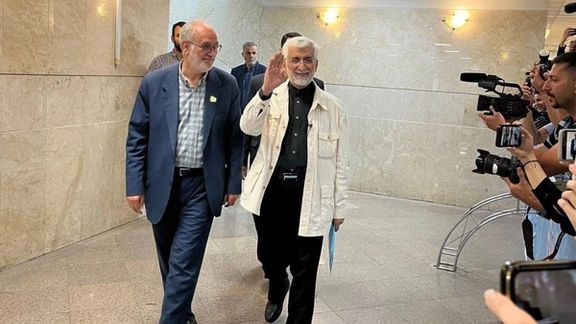
Saeed Jalili, a figurehead of the Iranian hardliner faction and close ally to Supreme Leader Ali Khamenei, has declared his candidacy for the upcoming presidential election.

Saeed Jalili, a figurehead of the Iranian hardliner faction and close ally to Supreme Leader Ali Khamenei, has declared his candidacy for the upcoming presidential election.
Scheduled for June 28, the polls follow the sudden death of President Ebrahim Raisi in a helicopter crash. Jalili, known for his uncompromising stance and deep integration into Iran's ruling elite, filed his candidacy on Thursday, accompanied by conservative lawmaker Amir Hossein Sabeti, a former television host now turned political figure.
This marks Jalili's third attempt at the presidency, having previously contested in 2013, where he finished third, and in 2021, where he withdrew to support the late Raisi.
His background includes roles such as the head of Iran's nuclear negotiation team and multiple senior positions within the ministry of foreign affairs.
Dozens of names suggested by political factions for the upcoming election encompass a range of former high-ranking officials, including past vice presidents like Es'haq Jahangiri and Mohammad Reza Aref; Hossein Marashi, who served as the chief of staff under President Akbar Hashemi Rafsanjani; former Parliament Speaker Ali Larijani; Abdolnaser Hemmati, the former governor of the Central Bank; Mohammad Bagher Ghalibaf, the current Parliament Speaker and Mohammad Sadr, a member of the Expediency Council.
As of now, the confirmed known registrants include reformist Mostafa Kavakebian and conservative figure Saeed Jalili.
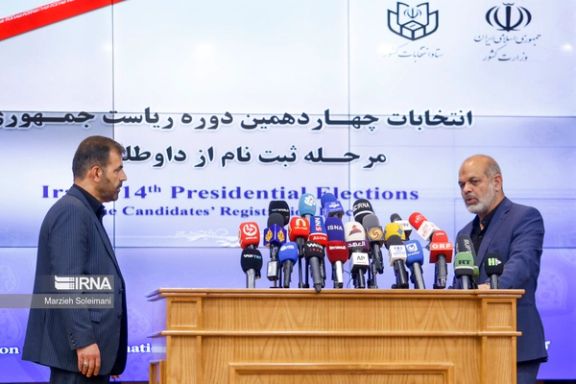
Political groups in Iran have been proposing candidates for the June 28 presidential election in a bid to encourage relatively moderate politicians to come forward and change the monolithic political landscape.
As candidate registration began on Thursday, the main question remained whether Supreme Leader Ali Khamenei and other hardliners will signal to reformists and other factions to come forward as candidates in the snap elections following President Ebrahim Raisi's death on May 19.
While moderates and reformists hope that Raisi's death will facilitate their political comeback, they seem to overlook that their isolation and exclusion from political activity are not the results of a democratic competition with Raisi and other hardliners. Rather, it was Khamenei’s loyalists who systematically barred other insiders from three elections since February 2020, pushing them out of the government.
While centrist and reformist newspapers put forward the names of more than 30 reform-minded political figures this week, Khamenei and hardliners in the government have not changed their mind and keep repeating what they said even before Raisi was officially pronounced dead. They are adamant that nothing is going to change. They want someone exactly like Raisi, meaning a hardliner loyal to the Supreme Leader.
During the week after Raisi's death officials and clerics have been glorifying him and fabricating "achievements" for him. And as they know it is difficult to convince the public about those achievements, they have been telling stories about links between Raisi and Muslim saints who died centuries ago.
Posters shout in large fonts: "You were not illiterate," referring to the public view that the late president had only a sixth-grade standard education and he spent the rest of his teenage years in Shiite seminaries. They also claim that under Raisi Iran had the second biggest economic growth rate in the world, while more than 10 million were added to the ranks of the poor under the heavy burden of a persistent 50% annual inflation rate.
Others highlight Raisi's broken promises: building four million homes, providing free Internet for low-income Iranians, supporting online businesses, reforming the banking system, facilitating the return of expats, cracking down on government corruption, halving medical costs, controlling inflation and exchange rates, and reviving the 2015 nuclear deal.
None of these promises have been even partially fulfilled, and the situation has worsened in the three years since Raisi took office. Nevertheless, hardliners still want someone similar to him as the new President. Mohammad Mokhber, the vice president and now acting president, has stated that the plan to build four million houses was intended to begin in Raisi's fourth year in office, had he survived.
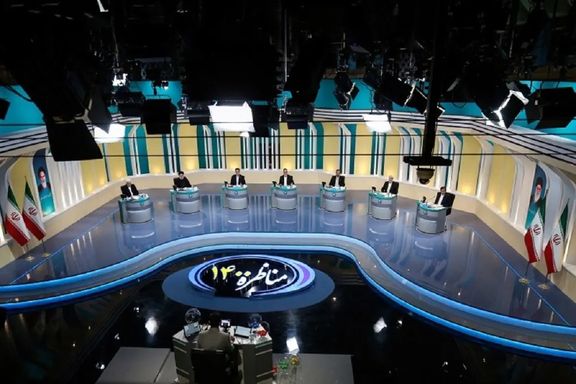
Dozens of names put forward by political groups include vice presidents, cabinet ministers and other state officials from the past, individuals such as former vice president Es'haq Jahangiri; the former chief of staff of President Akbar Hashemi Rafsanjani, Hossein Marashi; former vice president Mohammad Reza Aref; Former Majles Speaker Ali Larijani; former Central Bank Governor Abdolnaser Hemmati, and Expediency Council member Mohammad Sadr who has even prepared an election campaign video days before registration of candidates start.
But politicians proposing these names cannot explain what those individuals and others on their long lists have achieved during their long careers in the past 45 years.
On the conservative side, individuals close to the Supreme Leader's office, such as Parviz Fattah—a key figure in Khamenei’s “charity-business” conglomerate—have been named as potential candidates. Their careers have primarily involved protecting Khamenei's assets and channeling funds into ineffective projects and Iran’s regional ambitions.
During the past week, Vice President Mokhber has been mentioned at least five times as the best candidate to replace Raisi. However, he has repeatedly demurred, stating that he is currently too busy to run for the presidency. Other hardliners, like former Defense Minister Hossein Dehghan, have also declined, saying they have their current jobs and do not need to run for President. It is not clear if they know something others don’t.
With over 30 years of experience in dealing with every one of these possible candidates Khamenei knows them better than anyone else, and when he says there will not be any major change, he means it.
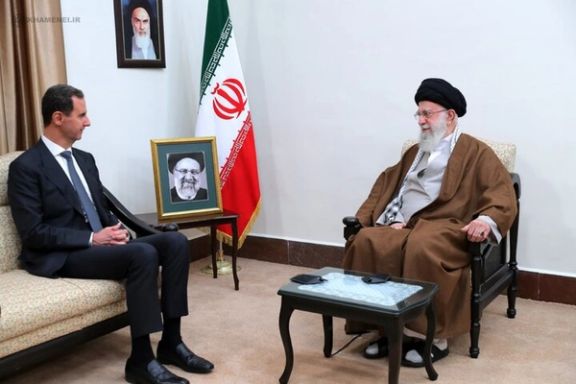
Iran’s Supreme Leader Ali Khamenei received his Syrian ally President Bashar al-Assad in Tehran on Thursday.
The visit comes shortly after the unexpected death of Iranian President Ebrahim Raisi in a helicopter crash. Assad’s visit is reportedly to offer condolences, reflecting the deep political and military alliance, criticized by many Iranians and Western governments.
Iran's semi-official Student News Network reported that Khamenei used the opportunity to assert that Western nations and their regional allies “failed” in their attempts to destabilize Syria’s government.
His remarks come amid widespread criticism of Iran's role in the Syrian civil war, which led to extensive human suffering and regional instability.
Assad was absent from Raisi’s funeral, with the country’s envoy to Tehran citing personal reasons for his absence, raising questions about the Syrian leader's commitment to his Iranian allies.
Iran has played a controversial role in the Syrian civil war, aligning itself with President Bashar al-Assad's regime against various opposition groups since the conflict began in 2011.
Tehran has provided substantial military support, including advisors, ground troops, and militia fighters from across the region, affecting the war's dynamics.
Iranian forces and militias are still in Syria, posing a threat to Israel that regularly launches air strikes against them.
Iran's involvement in Syria has been criticized internationally for perpetuating the conflict and contributing to the region's destabilization and countless deaths and widespread displacement.
Economically, the intervention has drained Iranian resources, contributing to domestic discontent amidst a struggling economy exacerbated by international sanctions.
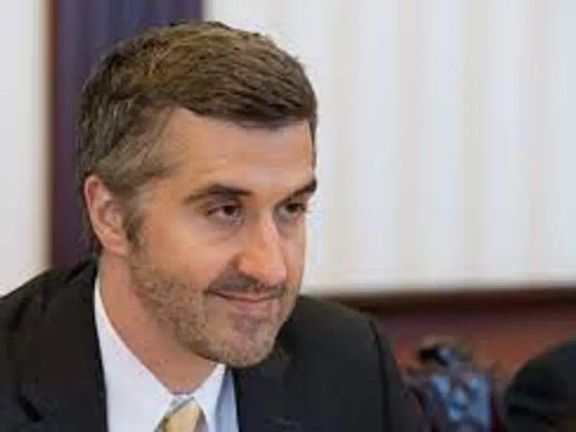
US Secretary of State, Antony Blinken, praised the work of US-Iranian Ramin Toloui, the Assistant Secretary for Economic and Business Affairs, leaving to pursue his career at Stanford University.
In a statement, Blinken said, "Ramin championed a guiding principle of our foreign policy: that economic security is national security."
According to the statement, throughout his service, Toloui was instrumental in implementing economic sanctions against Russia following its invasion of Ukraine, enhancing global food security, and addressing coercion by hostile international actors.
Blinken expressed deep appreciation for Toloui's "exceptional service," commending his leadership in engaging with the G20 and advancing partnerships with US businesses and workers.
Born and raised in Iowa City, Iowa, Toloui has an extensive background in both academia and the financial sector, having previously held positions at PIMCO and the Department of the Treasury before his appointment at the State Department.
Iranian-Americans, an integral part of the United States’ cultural fabric, have assumed critical roles across various sectors of American society, the biggest expatriate community of Iranians globally.
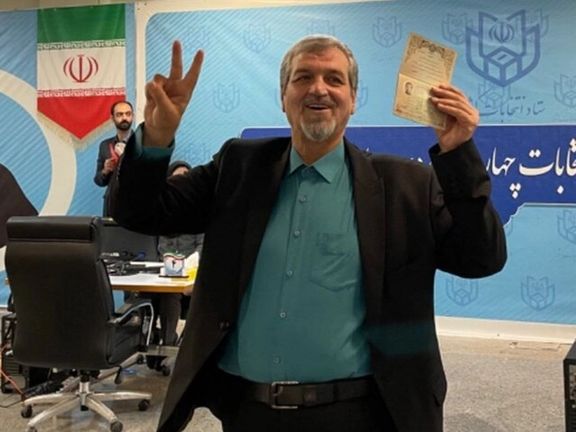
Mostafa Kavakebian, a reformist politician, has once again stepped into the fray by registering for the upcoming presidential election scheduled for June 28.
Kavakebian, 61, the Secretary General of the Democracy Party and editor-in-chief of the Mardomsalari newspaper, has faced numerous setbacks in his political career, including being disqualified by the conservative Guardian Council in 2005, 2013, 2017, and 2021 Presidential elections.
His political career includes serving as a representative in the Iranian Parliament for Tehran from 2016 to 2020, and earlier for Semnan and Mehdishahr from 2008 to 2012.
Meanwhile, an advisor to former interior minister Mostafa Pour-Mohammadi said Thursday that he too is going to register for the presidential election. Pour-Mohammadi, who served as minister of justice from 2013 to 2017, has been a controversial figure, particularly noted for his justification of the 1988 mass killings of political prisoners as fulfilling divine commandments.
Estimates indicate that between 4,500 and 10,000 prisoners were executed when the clerical rulers chose to eliminate those they considered oppositional.
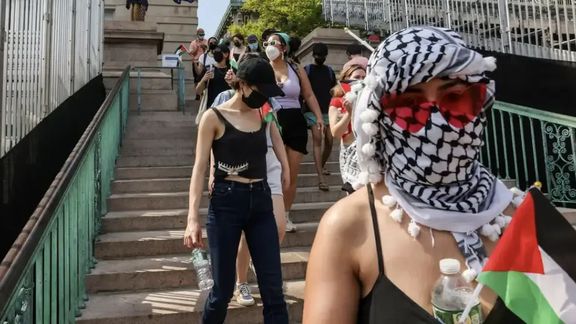
Iran's supreme leader has praised the pro-Palestine students, branding them part of Iran's 'resistance front' against the US and Israel.
“Dear university students in the United States of America, you are standing on the right side of history. You have now formed a branch of the Resistance Front and have begun an honorable struggle in the face of your government's ruthless pressure - which openly supports Zionists,” read a letter by Ali Khamenei.
The letter, dated May 25 and published on Khamenei's website on Thursday, predicts a "different fate awaits the important region of West Asia,” branding the students part of the “resistance front”, the group of militias Iran sponsors across the Middle East.
“The ‘resistance front,” the letter added, “rose amid this dark and bleak atmosphere, and the formation of ‘the Islamic Republic’ in Iran contributed to its expansion and strength.”
Thousands of students have taken to the streets and set up encampments at their campuses to protest against Israel which is in the midst of a war against Iran-backed Hamas in Gaza. Sparked by the Hamas invasion of October 7, in which 1,200 mostly civilians were killed, the retaliation has seen over 35,000 Palestinians killed according to Hamas. It has seen Israel accused of genocide as it continues its war aimed at annihilating Hamas and rescuing the remaining 125 hostages in Gaza. The US has defended Israel’s right to defend itself and continues to arm the world’s only Jewish state.
Khamenei added that the US administration had been providing the regime with continual political, economic, and arms support. “The American administration and its partners have not even as much as frowned upon this state terrorism and incessant oppression,” the letter read.
The letter sparked responses from across the political spectrum. US House Speaker Mike Johnson said: "When you’ve won the Ayatollah, you’ve lost America.”
Pro-Palestinian student protests in the US have been providing media fodder for the Islamic Republic as it continues to bet on political trouble overseas to make up for lost legitimacy at home.
Khamenei and his loyalists in the Iranian regime have seen victory in pro-Hamas protests in American universities, and the Supreme Leader on several occasions made sure to highlight this.
“Despite the extensive efforts of Zionists and their American and European supporters, the issue of Gaza remains the top global concern. Protests against the crimes of the Zionist regime in American universities and their expansion to European universities are signs of the continued sensitivity of public opinion worldwide to the Gaza issue,” Iran’s ruler said earlier in May.
A pro-government ideologue has expressed hope that the Islamic Republic can use the potential of pro-Palestinian protesting students at US campuses to form a new proxy group in America.
“I think the potential to repeat in the US what the Islamic Republic did in Lebanon is much higher. Our Hezbollah-style base in the US is much larger than what we have in Lebanon,” said University of Tehran professor Foad Izadi in an interview with Iran’s state TV in early May.
Khamenei has invested 35 years of his rule to relentlessly campaign against Israel, the United States and Western influence, not only in the Middle East but also in distant places in Africa and Latin America.
With heavy political and military investment on Hamas and other militant groups in the region, Khamenei seems desperate to showcase any sign of anti-Israeli and anti-Western public opinion at home and abroad as a sign of vindication for his worldview.
“The brutal and merciless behavior of the rabid Zionist dog proved the righteousness of the Islamic Republic's position and the Iranian people, and the massacre of thirty-some thousand people, half of whom are women and children, demonstrated the evil nature of the Zionist regime and the perpetual righteousness of Iran to the whole world,” according to Khamenei.
While Khamenei praises the protesters, Iran continues to quash dissent with hundreds of Iranians killed since 2022’s Women, Life, Freedom uprising and tens of thousands imprisoned.
Khamenei feels insecure after years of anti-regime protests by ordinary Iranians, whose social freedoms are being curtailed by Islamic restrictions and their economic status degraded by high inflation and lack of real jobs.